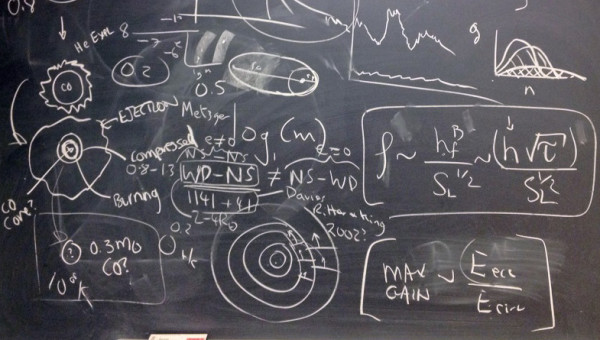Fads and Fallacies in the Name of Science
by Dr. Edward Feser
Filed under Science
NOTE: Today we begin a two part series by Dr. Edward Feser exploring questions about science, philosophy, causality, and radioactive decay. We'll share the second part on Wednesday.
At the Catholic blog Vox Nova, mathematics professor David Cruz-Uribe writes:
"I… am currently working through the metaphysics of St. Thomas Aquinas as part of his proofs of the existence of God… [S]ome possibly naive counter-examples from quantum mechanics come to mind. For instance, discussing the principle that nothing can change without being affected externally, I immediately thought of the spontaneous decay of atoms and even of particles (e.g., so-called proton decay).
This might be a very naive question: my knowledge of quantum mechanics is rusty and probably out of date, and I know much, much less about scholastic metaphysics. So can any of our readers point me to some useful references on this specific topic?"
I’ve discussed this issue before, and one of Cruz-Uribe’s readers directs him to a blog post of mine in which I responded to a version of this sort of objection raised by physicist Robert Oerter. Unfortunately, the combox discussion that ensues largely consists of a couple of Cruz-Uribe’s readers competing with each other to see who can emit the most squid ink (though Brandon Watson manfully tries to shine some light into the darkness). One reader starts things out by writing:
"Feser’s… argument seems to boil down to saying, 'Just because we can’t find a cause for quantum phenomena doesn’t mean there isn’t one.' … Thing is, Bell has shown that you can’t have local unknown variables in quantum events. Bohm’s interpretation would give you the possibility of unknown variables (thus taking out the random, seemingly acausal, aspect), but at the price of locality (in short, such variables would be global, and not tied to a specific location; so you lose any predictability, anyway)."
As readers of the post on Oerter know, this essentially just repeats the completely point-missing objection from Oerter that was the subject of the post, while ignoring what I said in the post in reply to the objection! The combox discussion goes downhill from there, with so many points missed, questions begged, and crucial distinctions blurred.
Cruz-Uribe’s reader accuses me of having a “weak” understanding of the relevant physics, which is why he launches into the mini lesson on Bell and Bohm. But it’s his reading skills that are weak, since I made it clear in the post that I wasn’t in the first place making any claim about the physics of systems of the sort in question, and thus wasn’t saying anything that could be incompatible with what we know from physics. In particular, I wasn’t advocating a “hidden variable theory” or the like, but rather making a purely philosophical point about causality that is entirely independent of such theories.
This is one of many factors that hinder fruitful discussion of these topics even with well-meaning people (like Cruz-Uribe) who know some science but know little philosophy. They constantly translate philosophical claims into the physics terms that they feel more comfortable and familiar with, and proceed to run off at high speed in the wrong direction.
This is why you really can’t address specific issues like radioactive decay without first doing some general philosophical stage-setting. For it’s never really the empirical or scientific details that are doing the work in objections to Scholastic metaphysics like the one at issue. What’s really doing the work is the ton of philosophical baggage that the critics unreflectively bring to bear on the subject—the assumptions they read into the physics and then read back out again, thinking they’ve raised a “scientific” objection when what they’ve really done is raised a question-begging philosophical objection disguised as a scientific objection.
(I imagine that educated religious people like Cruz-Uribe and his readers aren’t fooled by this kind of sleight of hand in other scientific contexts. For instance, I’d wager that they would be unimpressed by arguments to the effect that neuroscience has shown that free will is an illusion. As I have argued here and here, neuroscience has shown no such thing, and such claims invariably rest not on science but on tendentious philosophical assumptions that have been read into the scientific findings. But exactly the same thing is true of claims to the effect that quantum mechanics has falsified the principle of causality, or that Newton or Einstein refuted the Aristotelian analysis of change.)
In what follows, then, I will first prepare the ground by calling attention to some common fallacies committed by critics of Scholastic metaphysics who appeal to modern physics—fallacies some of which are committed by Cruz-Uribe’s readers in the course of their combox discussion. Anyone wanting to comment intelligently on the subject at hand has to take care to avoid these fallacies. Second, I will make some general remarks about what a philosophical approach to the subject at hand involves, as opposed to the approach taken by physics. (I’ve discussed this issue many times before, and indeed did so in a couple of posts—here and here—that followed up the post on Oerter that Cruz-Uribe and his readers were discussing.) Finally, in light of this background I’ll address the specific issue of radioactive decay and causality.
Fads and Fallacies in the Name of Science
So, let’s consider some of the confusions that are rife in discussions of the relationship between physics on the one hand and philosophy (and in particular Scholastic philosophy) on the other:
A. Conflating empirical and metaphysical issues: Those who know some science but not a lot of philosophy very often assume that when a Scholastic philosopher says something about the nature of causality, or substance, or matter, or the like, then he is making a claim that stands or falls with what physics tells us, or at any rate should stand or fall with what physics tells us. But this is a category mistake. Scholastic metaphysics is not in competition with physics, but approaches the phenomena at a different (and indeed deeper) level of analysis. Its claims do not stand or fall with the findings of physics, any more than the claims of arithmetic stand or fall with the findings of physics. Indeed, like arithmetic, the basic theses of Scholastic metaphysics are (so the Scholastic argues) something any possible physics must presuppose.
Sometimes the critics assume that Scholastic metaphysics is in competition with physics because they are themselves making question-begging metaphysical assumptions. For instance, they might assume that any rationally justifiable claim about the nature of matter simply must be susceptible of formulation in the mathematical language of physics, or must be susceptible of empirical falsification. They are essentially making a metaphysics out of physics. Only physics can tell us anything about the nature of physical reality (so the critic supposes), so any claim about the nature of physical reality is implicitly, even if not explicitly, a claim of physics. As we will see below, this cannot possibly be right. Physics cannot even in principle tell us everything there is to know about physical reality (let alone reality more generally). But even if the assumption in question could be right, it simply begs the question against the Scholastic merely to assert it, since the Scholastic rejects this assumption, and on the basis of arguments that need to be answered rather than ignored (arguments I’ll discuss below).
Sometimes the conflation of empirical and metaphysical issues is due less to such large-scale philosophical assumptions than to a simple fallacy of equivocation. Both physicists and Scholastic metaphysicians use terms like “cause,” “matter,” and the like. A superficial reading therefore often leads critics to assume that they are addressing the same issues, when in fact they are very often not using the key terms in the same sense.
Sometimes the conflation is due to sheer intellectual sloppiness. Critics will formulate the issues in ridiculously sweeping terms, making peremptory claims to the effect that “Aristotelianism was refuted by modern science,” for example. In fact, of course, the labels “Aristotelianism” and “modern science” each cover a large number of distinct and logically independent ideas and arguments, and these need carefully to be disentangled before the question of the relationship between Scholastic metaphysics and modern physics can fruitfully be addressed. It is no good to say (for example) that since Aristotle’s geocentrism and theory of natural place have been falsified, “therefore” we should not take seriously his theory of act and potency or the account of causality that rests on it. This is simply a non sequitur. Such issues are completely independent of one another, logically speaking (regardless of the contingent historical association between them).
B. Conflating genus and species: Even when physicists and Scholastic metaphysicians are using terms in the same sense, critics often confuse what is really only a specific instance of the general class named by a term with the general class itself. For example, where the notion of “cause” is concerned, Scholastic metaphysicians distinguish between formal, material, efficient, and final causes. Where efficient causes are concerned, they distinguish between principal and instrumental causes, between series of causes which are essentially ordered and those which are accidentally ordered, and between those which operate simultaneously versus those which are ordered in time. They distinguish between total causes and partial causes, and between proximate and remote causes. They regard causality as primarily a feature of substances and only secondarily as a relation between events. They distinguish between causal powers and the operation of those powers, between active causal power and passive potencies. And so forth. All of these distinctions are backed by arguments, and the Scholastic maintains that they are all necessary in order to capture the complexity of causal relations as they exist in the actual world.
Now, those who criticize Scholastic metaphysics on scientific grounds typically operate with a very narrow understanding of causality. In particular, they often conceive of it as a deterministic relation holding between temporally separated events. They will then argue (for example) that quantum mechanics has undermined causality thus understood, and conclude that it has therefore undermined causality full stop. One problem with this, of course, is that whether quantum mechanics really is incompatible with determinism is a matter of controversy, though as I have said, nothing in the Scholastic position stands or falls with the defensibility of Bohmian hidden variable theories. The deeper point is that it is simply fallacious to suppose that to undermine one kind of causality (and in one kind of context) is to undermine causality as such. Certainly it begs the question against the Scholastic, who denies that all causality reduces to deterministic relations holding between temporally separated events.
The conflation of a general class with a specific kind within the general class is evident too in discussions of motion. Scholastics and other Aristotelians think of motion in general as change, and change as the actualization of potency. Local motion or change with respect to place or location is just one kind of actualization of a potency, and is metaphysically less fundamental than other kinds. When motion is discussed in modern physics, however, it is of course local motion that is exclusively in view.
There is nothing necessarily wrong with this focus, but it would be fallacious to draw, from what modern physics says about “motion” (in the sense of local motion), sweeping conclusions about what Aristotelians say about “motion” (in the sense of the actualization of potency). This would be to confuse what is true of one kind of change for what is true of change as such. Yet this kind of fallacious conflation is very common. Of course, a critic of Scholastic metaphysics might claim that local motion is the only kind of change there really is, but merely to assert this is simply to beg the question against the Scholastic, who has arguments for the claim that local motion cannot be the only kind of change there is. (I have addressed this particular issue in detail elsewhere, e.g. here and here.)
C. Confusing general principles with specific applications of those principles: When a thinker, whether a philosopher or a scientist, puts forward a general principle, he sometimes illustrates it with examples that later turn out to be deficient. But it simply doesn’t follow that the general principle itself is mistaken. For example, people often think of the evolution of the horse as a neat transition from very small animals to ever larger ones, as in the kind of exhibit they might have seen in a natural history museum as a child. It turns out that things aren’t quite so neat. There is no hard and fast correlation between the size of a horse and where it appears in the fossil record. It doesn’t follow, however, that modern horses did not evolve from much smaller animals. That earlier accounts of the evolution of the horse turn out to be mistaken does not entail that the general principle that horses evolved is mistaken. (Intelligent Design enthusiasts are kindly asked to spare us any frantic comments about evolution. This is not a post about that subject. It’s just an example.)
However, though philosophical naturalists never tire of making this point when Darwinism is in question, they suddenly forget it when Aristotelianism or Scholasticism is what is at issue. For example, Aristotelians defend the reality of final causality the idea that natural substances and processes are inherently “directed towards” certain characteristic effects or ranges of effects. In previous centuries, the idea was often illustrated in terms of Aristotle’s view that heavy objects are naturally directed toward the center of the earth as their “natural place.” That turns out to be mistaken. This is often treated as a reason for rejecting the idea of final causality as such, but this simply doesn’t follow. In general, the deficiencies of this or that illustration of some Scholastic metaphysical thesis are simply not grounds for rejecting the thesis itself. (I’ve addressed this issue at greater length before, e.g. here, here, and here.)
The Limits of Physics
So that’s one set of background considerations that must be kept in mind when addressing topics like the one at issue: the begged questions, blurred distinctions, and missed points which chronically afflict the thinking of those who raise purportedly scientific objections to Scholastic metaphysics. Let’s move on now to the second set of background considerations, viz. the limits in principle to what physics can tell us about physical reality, and the unavoidability of a deeper metaphysical perspective.
As I have emphasized many times, what physics gives us is a description of the mathematical structure of physical reality. It abstracts from any aspect of reality which cannot be captured via its exclusively quantitative methods. One reason that this is crucial to keep in mind is that from the fact that something doesn’t show up in the description physics gives us, it doesn’t follow that it isn’t there in the physical world. This is like concluding from the fact that color doesn’t show up in a black and white pen and ink drawing of a banana that bananas must not really be yellow. In both cases the absence is an artifact of the method employed, and has nothing whatsoever to do with the reality the method is being used to represent. The method of representing an object using black ink on white paper will necessarily leave out color even if it is there, and the method of representing physical reality using exclusively mathematical language will necessarily leave out any aspect of physical reality which is not reducible to the quantitative, even if such aspects are there.
But it’s not just that such aspects might be there. They must be there. The quantitative description physics gives us is essentially a description of mathematical structure. But mathematical structure by itself is a mere abstraction. It cannot be all there is, because structure presupposes something concrete which has the structure. Indeed, physics itself tells us that the abstraction cannot be all there is, since it tells us that some abstract mathematical structures do not fit the actual, concrete material world. For example, Einstein is commonly taken to have shown that our world is not really Euclidean. This could only be true if there is some concrete reality that instantiates a non-Euclidean abstract structure rather than a Euclidean abstract structure. So, physics itself implies that there must be more to the world than the abstract structure it captures in its purely mathematical description, but it does not and cannot tell us exactly what this concrete reality is like.
That physics by itself only gives us abstract structure is by no means either a new point or a point emphasized by Scholastics alone. It was made in earlier generations by thinkers like Poincaré, Russell, Eddington, Weyl, and others, and in recent philosophy has been emphasized by Grover Maxwell, Michael Lockwood, Simon Blackburn, David Chalmers, and others.
Moreover, we know there must be more to causality specifically than physics does or could tell us about. The early Russell once argued that causation must not be a real feature of the world precisely because it does not show up in the description of the world physics gives us. For physics, says Russell, describes the world in terms of differential equations describing functional relations between events, and these equations make no reference to causes. “In the motions of mutually gravitating bodies, there is nothing that can be called a cause, and nothing that can be called an effect; there is merely a formula” (“On the Notion of Cause,” pp. 173-74). Russell’s position has been the subject of a fair bit of attention in recent philosophy (e.g. here).
Now, I don’t myself think it is quite right to say that physics makes no use of causal notions, since I think that physics tells us something about the dispositional features of fundamental particles, and dispositionality is a causal notion. Still, as other philosophers have argued, higher-level causal features—such as the causation we take ourselves to experience continuously in everyday life, in the behavior of tables, chairs, rocks, trees, and other ordinary objects—are more difficult to cash out in terms of what is going on at the micro level described by physics. Hilary Putnam is one contemporary philosopher who has addressed this problem, as I noted in a post from a few years ago. Trenton Merricks is another, and argues that at least macro-level inanimate objects are unreal, since (he claims) they play no causal role in the world over and above the causal role played by their microphysical parts.
Merricks thinks living things are real, and certainly a Russell-style, across-the-board denial of causation would be incoherent, for a reason implicit in a fact that the later Russell himself emphasized. Our perceptual experiences give us knowledge of the external physical world only because they are causally related to that world. To deny causality in the name of science would therefore be to undermine the very empirical foundations of science.
Related Posts
Note: Our goal is to cultivate serious and respectful dialogue. While it's OK to disagree—even encouraged!—any snarky, offensive, or off-topic comments will be deleted. Before commenting please read the Commenting Rules and Tips. If you're having trouble commenting, read the Commenting Instructions.













